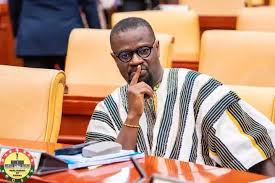Minority Chief Whip in Ghana’s Parliament, Frank Annoh-Dompreh, has urged the country to adopt a bold new vision for Green, Healthy, and Inclusive Cities that harmonize economic ambition with environmental stewardship.
Delivering a statement on the floor of Parliament on Tuesday, the Nsawam-Adoagyiri MP, an environmentalist said Ghana’s urban transformation must be guided by ecological wisdom, justice, and innovation to create “cities that breathe, move, and heal.”
According to Annoh-Dompreh, Ghana’s cities, once symbols of vitality and promise are now “straining under the weight of their own success” and cautioned that unchecked urban expansion, congestion, and pollution were eroding the liveability of major cities like Accra, Kumasi, Tamale, and Takoradi, urging immediate, evidence-based reforms to safeguard the wellbeing of citizens and future generations.
“There comes a defining moment in the life of every nation when progress can no longer be measured by the grandeur of its skylines or the length of its highways, but by the harmony it achieves between humanity and nature. Ghana stands today at that crossroads”, he said.
Rising Urban Pressure and Economic Cost
Citing data from the Ghana Statistical Service, Annoh-Dompreh revealed that 56.7% of Ghanaians now live in urban areas, up from 50.9% in 2010, and the figure is projected to surpass 60% by 2030.
The Nsawam Adoagyiri MP observes that, whiles cities contribute over 70% of Ghana’s GDP, they also generate more than 12,000 tonnes of solid waste daily, with only about 70% collected and even less properly treated.
He warned that poor sanitation, pollution, and waste mismanagement together cost Ghana nearly 3% of GDP annually, according to the World Bank, undermining productivity, public health, and tourism.
Air pollution, particularly in Accra, has reached alarming levels, with the Environmental Protection Authority (EPA) attributing about 40% of PM2.5 pollution to road transport emissions. This, he said, has made respiratory diseases one of the top five causes of outpatient visits in the Greater Accra Region.
“If this trajectory continues unchecked, by 2040 Accra could host over 7 million people living amid worsening congestion, flooding, and rising temperatures”.
Learning from Global Best Practices
The Minority Chief Whip drew lessons from cities like Kigali, Singapore, and Copenhagen, which have successfully implemented sustainable urban renewal strategies.
- Kigali (Rwanda): Once disorganized, it now stands out as one of Africa’s cleanest capitals through strict sanitation enforcement, waste collection, and green space development.
- Singapore: Its “City in Nature” strategy integrates green design, public transport electrification, and compact “15-minute neighbourhoods.”
- Copenhagen (Denmark): By prioritizing cycling and pedestrian-friendly infrastructure, the city has reduced emissions while enhancing quality of life.
He said Ghana could replicate these examples through strong political will, community participation, and citywide enforcement.
A Roadmap for Urban Transformation
Mr Annoh-Dompreh outlined a five-point national strategy to guide Ghana’s transition toward greener cities:
- Greening and Reforestation of Urban Spaces – Increasing tree canopy cover by 10–15% within a decade and reserving 12% of new development for parks and open spaces.
- Clean and Inclusive Transport – Modernizing public transport with electric buses and non-motorized corridors to cut congestion and emissions.
- Decongesting Public Spaces – Reorganizing markets and terminals into structured multi-level complexes with better spatial planning.
- Human-Centered Settlement Planning – Integrating sanitation, schools, and clinics within walkable “15-minute city” models.
- Circular Waste Economy – Transitioning from collection-only systems to recycling and composting initiatives that create green jobs.
Bipartisan Support and Government Commitment
Lawmakers from both sides of the House commended the Nsawam-Adoagyiri MP for his visionary call, emphasizing the urgency of rethinking urban policy to align with Ghana’s climate and development goals.
Minister for Local Government, Chieftaincy and Religious Affairs, Ahmed Ibrahim, pledged to adopt the Hansard on the debate to guide the Ministry’s future policy interventions.
“This is a forward-looking proposal that aligns with our decentralization and sustainability agenda. The Ministry will study the parliamentary contributions and use them to shape our policy direction,” the Minister assured.
A Call to Action
Concluding his statement, Annoh-Dompreh urged Ghana to act with urgency and purpose:
“The destiny of our cities is the destiny of our nation. Let us build with foresight crafting cities that reflect the balance between progress and preservation. The time to green our cities, and secure the wellbeing of generations to come, is now.”



